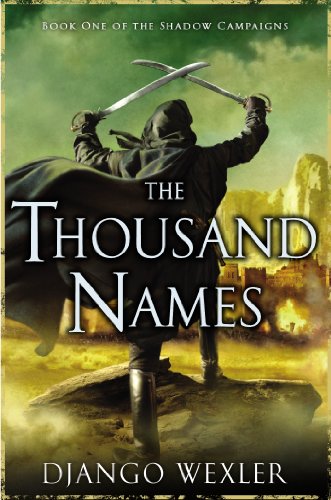
![]() The Thousand Names by Django Wexler
The Thousand Names by Django Wexler
The Thousand Names is incredible. Yes, right out of the chute I am saying that I loved this book. It’s not going to be for everyone because it’s in this new Blackpowder genre that I am only recently getting acquainted with. Basically, it’s a mix of Napoleonic era military technology and aspects of magic. The exact mix depends on the author, but it certainly can create some fun interesting props to tell a story with. When you add that level of technology…. well, the lines between nobility and peasants, men and women, blur compared to traditional fantasy and that can be a refreshing change when it is done well.
The Thousand Names mostly revolves around three different characters. Jaffa, a quasi police administrator in the city of Khandar; Winter Ihernglass, a young Soldier in the Vordanai First Colonial Regiment who is hiding the fact that she is female from her fellow Soldiers; and Marcus d’Ivoire, the senior Captain in the Colonials after the previous commander was killed. Each of them represent some very interesting personality types and their motivations are what make the book so compelling.
Count Colonel Janus bet Vhalnech Meiran has come to take command of the Colonials and to lead them to triumph over the fundamentalist religious fanatics who have driven the Vordanai troops and their puppet, the Prince of Khandar, out of power. Colonel Janus is something of an aberration from the Royal Army norm. His approach to commanding the Colonials is unorthodox, his education and knowledge of things ranging from the native language to the local fauna is impressive and his admitted feud with another noble, whose political power and position exceed his own, is daunting. Even with the new troops that COL Janus has brought with him from Vordanai, the numbers are terribly against them.
Into this complex brew of loyalties, secrets and a really difficult military problem we inject magic. It’s not like big spells are being tossed around all over the place, but more of a subtle presence in the shadows that makes itself known gradually to the main characters. Django Wexler does a good job of orchestrating their reactions to match up well with their personalities. CPT d’Ivoire, a solid, dutiful officer, is the most interesting to read about because he is constantly having his loyalties challenged and when he is exposed to magic it sends shockwaves all through his frame of reference.
As a soldier I appreciate it when an author competently represents not only the drudgery of a military existence, but also injects small examples of why lessons learned from the past can make a dramatic difference. A lot of the focus of The Thousand Names is the military campaign of the Colonials and Wexler does a good job of creating small points of impact where a minor, almost insignificant change, like adjusting a traditional company level formation to a smaller group and practicing it, can lead to much larger changes later. Those kinds of details and an appreciation for the difference between a trained force and an untrained rabble give The Thousand Names a welcome dash of realism.
The Thousand Names is a promising start to Django Wexler’s new series. The different elements of the plot, some of which I am not completely comfortable with alone, blend together to create a very palatable story. Each element taken on its own might not make sense, but they all work well together. I appreciated the gritty details that made the military campaign feel as unpleasant as they really are without making the story dull. I can’t wait for the next book in the series.


I pre-ordered the ebook along with A Discourse of Steel, which I’m reading now. Just the name and cover alone caught my interest. It’s next up on my tbr list and I’m even more jazzed after this review.